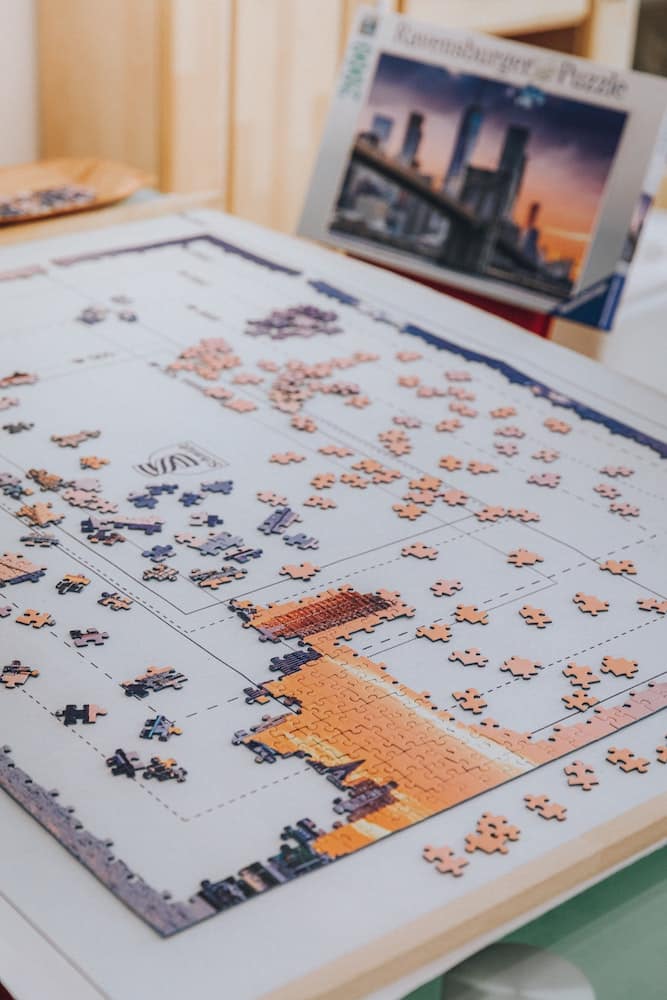Last Updated on February 2, 2022 by JigsawPuzzleGuru

In today’s blog, we’re looking at puzzle etiquette, what Larry David might call the “unwritten rules of jigsaw society.” Completing a jigsaw is not only beneficial to your mental health and a great way to spend some of your free time, but it’s also one of the most civilized activities in which one can meaningfully engage either alone or with other people.
Of course, when you are completing a jigsaw solo, you can easily make your own rules and proceed how you want without offending the sensibilities of other jigsaw fans — unless you publicize your puzzle on social media, of course. Things can be different when working on a jigsaw puzzle as part of a group, though.
Principally, we’re looking at habits that could constitute a major no-no in the puzzling community. Here are some of the jigsaw puzzle “Don’ts” that you should think about when working with a jigsaw partner:
Do you need an awesome puzzle to work? Check out: Types of Jigsaw Puzzles: 8 Different Variations
Jigsaw Puzzle Guru
Table of Contents
#1: Don’t Dictate the Rules of Engagement
When you get together in your group or partnership to work on a puzzle, it’s essential to agree on some of the main ground rules. This is because people have different ideas about what is the “right way” to complete a jigsaw puzzle.
For example, some say that looking at the picture on the box is cheating. Others see that as a necessary step to getting the puzzle done right. This being the case, it’s vital that you discuss rules of engagement together. The other big faux pas is for one group member to become the Jigsaw Bonaparte, issuing orders and edicts to the rest of the group. It’s no fun to puzzle like that.
If you’ve got a like-minded group, then setting some simple rules shouldn’t be too much of an ask, as should a requirement to not break those rules as the puzzle proceeds. Remember that we have two ears and one mouth, so we should be listening twice as much as we speak.

#2: Don’t Cross Into Others’ Territory
Dividing the puzzle into sections and tackling individual parts is a common way that jigsaws get done cooperatively. When the puzzle is underway, it’s generally considered bad etiquette to stray from your territory and start working on someone else’s uninvited.
If you’ve finished your own section, then that’s great! You’ve earned a break, an iced tea, and some Rice Krispies squares. It’s not your job to then take over someone else’s section for them. If they invite your help, of course, then that’s a different story altogether. The point here is not to be pushy about other people’s sections. Focus on your own until it gets done, and the puzzle will proceed in much greater harmony.
#3: Don’t Disrespect Agreed-Upon Rules and Strategy
Relating to the first rule, it is the height of bad puzzle etiquette for one participant to unilaterally decide to break various rules to suit their puzzling wants and needs. The best example of this would probably be whether or not to refer to the picture on the box. Another could be to go against an agreed-upon strategy to start with the edge pieces and assemble the border in our section first. A further example could be how to sort the pieces before getting started.
Just imagine one puzzler deciding to themself that they are bored of trying to get the puzzle done that way and want to now refer to the picture to speed things up. It may work for that person, but it breaks the kind of “code” that you formed before the puzzle began.
When you’ve agreed as a group to proceed in a certain way, then it behooves you to follow the rules like everyone else. It’s awful etiquette to try and place yourself above your fellow puzzlers as someone to whom these rules don’t apply. Either we stand on our agreed jigsaw principles, or we do not stand at all among the puzzlers of the world.
#4: Offer a Helping Hand, but Don’t Ignore the Response
This point is an extension of rule #2. It may get to the point where you have finished your section of the puzzle, but others are still working on theirs. They may be going a bit more slowly, being more methodical, or simply taking their time and enjoying the challenge. In any event, it is atrocious manners to barge in and start “helping” them.
First of all, you’re assuming that the person can’t get the task done by themselves, which is a pretty big insult to a puzzler. You wouldn’t take somebody’s crossword from them half-done and proceed to complete it in their absence. It’s great to offer a helping hand when you are free to do so, but if they respectfully decline your offer, you have to respect that, too.
What’s more, in this situation, you are there to help your fellow puzzler, not to take over and start changing their method. If you’re a guest helper in their section, then follow their direction.
#5: Don’t Make it Competitive
Even though many puzzlers take part in jigsaw-solving competitions, it shouldn’t be up to any one member of the group to make a jigsaw puzzle competitive against the will of the others. Many of us have friends or family members who are very competitive, and that often channels positively in their lives. When everyone is trying to have a nice time solving a jigsaw puzzle, however, it can be not very pleasant.
Don’t impose your competitive rules on the group if they don’t want to. Once again, if the others share your ethos, and are “in” as it were for the competitive rules, then that’s great. It can be more fun when you introduce racing or another competitive element. Just remember that to impose it is horrible puzzle etiquette.

#6: Don’t Make Idle Chit-Chat
Another area to be wary of is that of chit-chat and gossip while you’re puzzling. Many jigsaws require quite a lot of focus and concentration. If there are puzzlers in the group who need quiet, you should respect that and try not to be too disruptive. Naturally, an overlying conversation will take hold while the puzzle is going on, and very likely, it will be about the puzzle itself. The point is not to take the conversation too widely to areas that others don’t want to discuss, nor to badger other puzzlers with questions, inane chatter, and observations.
#7: Don’t Hurry Others Along
Finally, one other point of etiquette in the jigsaw puzzle world is not to hurry others along when you’ve finished. Everyone goes at their own pace, and if you’re faster than someone else, it doesn’t make you “better,” nor does it give you the right to rush and hurry others along to complete their section. You’ll come across like one of those parents who sit in the bleachers yelling at their kids during sports games. Nobody likes that, least of all those who respect the unwritten rules of jigsaw puzzling.
Respect the Etiquette; Enjoy the Puzzle
When we all follow these unwritten rules of the jigsaw puzzle, we can all enjoy a better experience overall. Jigsaws, unfortunately, do have the power to create frustration and discord between people who perceive one another as breaking the rules or not following the proper etiquette. Let’s agree on these principles, and our puzzling days will remain happy.
Need more puzzling tips? Check out 7 Tips for Solving Jigsaw Puzzles
